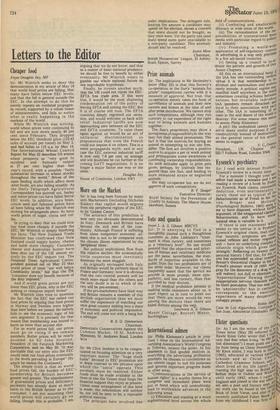Cheaper food
From Douglas Jay, MP
Sir: Mr Wistrich seeks to deny the demonstration in my article of May 18 that world food prices are falling, that many have fallen below EEC levels, and that the fall is general outside the EEC. In the attempt to do this he merely repeats an outdated propaganda record, supported by a whole tissue of misstatements, and fails to notice what is really happening in the markets of the world.
While Mr Wistrich was writing, world wheat prices were continuing to fall and are now down nearly 40 per cent since February. They dropped below the EEC threshold price (122.43 units of account per tonne) on May 2, and had fallen to 115 u.a. by May 13. The International Wheat Council Report for May 22 describes US winter wheat prospects as "very good to excellent and forecasts output at 27 per cent higher than last year's record, with a possible "fairly substantial increase in wheat stocks throughout the world." Prices of the main feeding stuffs which affect most other foods, are also falling steadily. As the Daily Telegraph Agricultural Correspondent has pointed out, barley and maize-prices too have fallen below EEC levels. In addition, soya bean, cotton seed and fishmeal prices have all been falling while Mr. Wistrich was reciting his propaganda piece. So have world prices of sugar, cocoa and coffee.
In trying to deny that we could now buy food more cheaply if outside the EEC, Mr Wistrich is simply falsifying the facts. The New Zealand Trade Minister has confirmed that New Zealand could supply butter, cheese and lamb more cheaply. Canadian cheese and Australian butter have been shut out of the UK almost entirely by the EEC import tax. The Financial Times Agricultural Correspondent pointed out on May 22 that world prices of meat "are well below Community levels," but that the OK "consumer does not benefit because of the duty imposed."
And if world grain prices are not lower than EEC prices, why is the EEC seeking to reimpose import levies? Mr Wistrich then tries to question the fact that the EEC has raised our food prices by arguing that food prices in Norway and Sweden were higher than here before we joined. He naively fails to see the economic logic of his own argument. It is precisely for that reason that membership was bound to harm us more than anyone else. For as world prices fall, our prices must go on rising if we remain members. Butter prices will be nearly doubled. As Sir John Stratton, President of the Fatstock Marketing Corporation, said on May 20: "It was inevitable that our entry into the EEC would raise our food prices eventually to the levels prevailing in Europe" (by which he means the Continent). The simple truth is that as world food prices fall, the burden of EEC membership for Britain becomes greater and greater. The abandonment of guaranteed prices and deficiency payments has already done as much harm to the British farmer as to the consumer. I am not assuming that world prices will certainly go on falling, though this is probable. I am arguing that we do not know, and that as a matter of basic national prudence, we should be free to benefit by either eventuality. Mr Wistrich wants to gamble our whole national future on one improbable hypothesis.
Finally, he invents another myth: that the UK could not rejoin the EECEFTA free trade area. If this were true, it would be the most shattering condemnation yet of the policy of leaving EFTA and joining the EEC. But it is of course not true. The EFTA countries deeply regretted our secession, and would welcome us back with relief. Industrial tariffs are now approaching zero between all the EEC and EFTA countries. To raise them again against us would be an act of unilateral discrimination so preposterous that even the French could not impose it on others. This is a mere propaganda myth; and in any case the EEC external industrial tariff is now only 7-8 per cent on average and will doubtless be cut further in the coming GATT negotiations. It is no longer a major factor one way or the other.
Douglas Jay House of Commons, London SW1


































 Previous page
Previous page